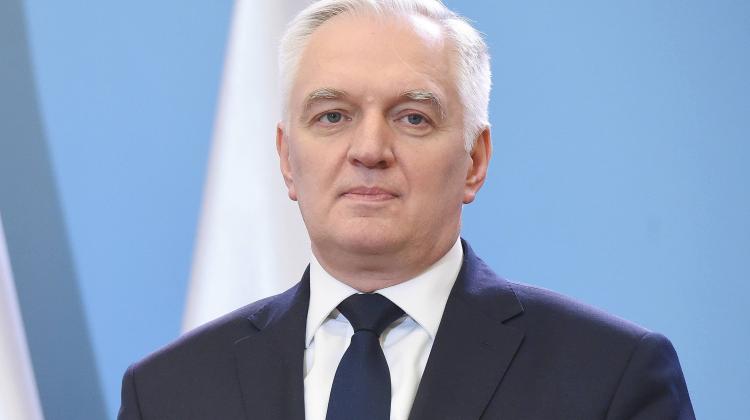Gowin on scientific staff vetting: The community accepted the idea
 Warsaw, 27.12.2017. Deputy Prime Minister, Minister of Science Jarosław Gowin during a joint press conference with the Prime Minister, Minister of Development and Finance Mateusz Morawiecki. PAP/Radek Pietruszka
Warsaw, 27.12.2017. Deputy Prime Minister, Minister of Science Jarosław Gowin during a joint press conference with the Prime Minister, Minister of Development and Finance Mateusz Morawiecki. PAP/Radek Pietruszka
Although the new universities bill contains radical solutions for removing former communist collaborators, it has not triggered protests in the academic community, Minister of Science Jarosław Gowin said on Monday. According to Gowin, the academic community has accepted the ideas included in the bill.
Deputy Prime Minister, Minister of Science and Higher Education Jarosław Gowin presented the first version of the new higher education and science bill in September 2017. Consultations of the bill also started at that point. A new version of the bill - revised following the comments from public and inter-ministerial consultations - was presented on Monday.
On Monday morning, Minister of Science was asked on Polish Radio 1 about the provisions regarding the vetting of academic staff included in the bill. "The bill contains the most radical solutions for removing former communist collaborators among all the laws that have appeared over the last 28 years. Please note that there is no controversy in the academic community regarding these solutions" - said Gowin.
According to the bill presented in September, a member of university council, a member of university senate, a member of the Scientific Evaluation Commission, Scientific Excellence Council, Polish Accreditation Committee or titular professor may be a person who "between July 22, 1944 and July 31, 1990, did not work or serve in state security agencies within the meaning of Article 2 of the Law of 18 October 2006 on Disclosure of Information on Documents of State Security Agencies from 1944-1990 and the Content of These Documents, and did not cooperate with those agencies".
"The academic community has accepted the solutions that I proposed" - Deputy Prime Minister emphasised.
He added that from the very beginning his ministry had been in an "honest, earnest dialogue with the academic community". "In general, the community supports the bill as a whole, but also in this morally delicate matter of settling accounts with the remnants of communism, people who have disgraced themselves by cooperating with the communist services" - the minister said.
Jarosław Gowin reminded that over the last four months the ministry had been receiving comments for the bill. "During those months, has there been even one protest against this part of the law that prohibits people who have disgraced themselves by cooperating with the communist services from holding important positions at universities? In the new version, which I will present today, we will go a step further. Those people will not be allowed to receive the title of professor in the future. It is an honorary title bestowed by the President of the Republic of Poland. We believe that this title must be a guarantee of the moral integrity of its holder" - Deputy Prime Minister declared.
There have been voices of criticism in the community concerning the ideas related to vetting but the general consensus was that the new solutions would not present a big problem. For example, Prof. Andrzej Jajszczyk, a member of the National Congress of Science Council, said in September (after the presentation of the first version of the bill) that the solution concerning this issue "did not appeal to him". He added, however, that the problem of cooperation with security services concerned older people who would gradually leave science. "I think it will not be a big problem" - he said.
The rector of the Jagiellonian University Prof. Wojciech Nowak commented: "I am during my second term as Rector, I was Vice-Rector and dean. I was vetted each time. We have gotten used to this. On the university scale, this vetting was not a problem at all. As for these potential new candidates - I do not like this new idea. Although we know that the idea is: let\'s be ethically clean. It\'s pure politics and not a problem at any university".
Currently, pursuant to the Vetting Law of 2006, vetting declarations must be submitted by: rectors and vice-rectors of public and non-public higher education institutions, members of the General Council of Science and Higher Education, Polish Accreditation Committee, Central Committee for Degrees and Titles, director and deputy director of the National Science Centre and the National Centre for Research and Development, as well as people employed in public higher education, the Polish Academy of Sciences or the research institute as: manager or deputy manager of a basic organizational unit, in particular dean or deputy dean of a department, director of an institute, deputy director of an institute, chancellor, bursar, president, vice-president, scientific secretary.
PAP - Science in Poland, Ludwika Tomala
lt/ agt/ kap/
tr. RL
Przed dodaniem komentarza prosimy o zapoznanie z Regulaminem forum serwisu Nauka w Polsce.















